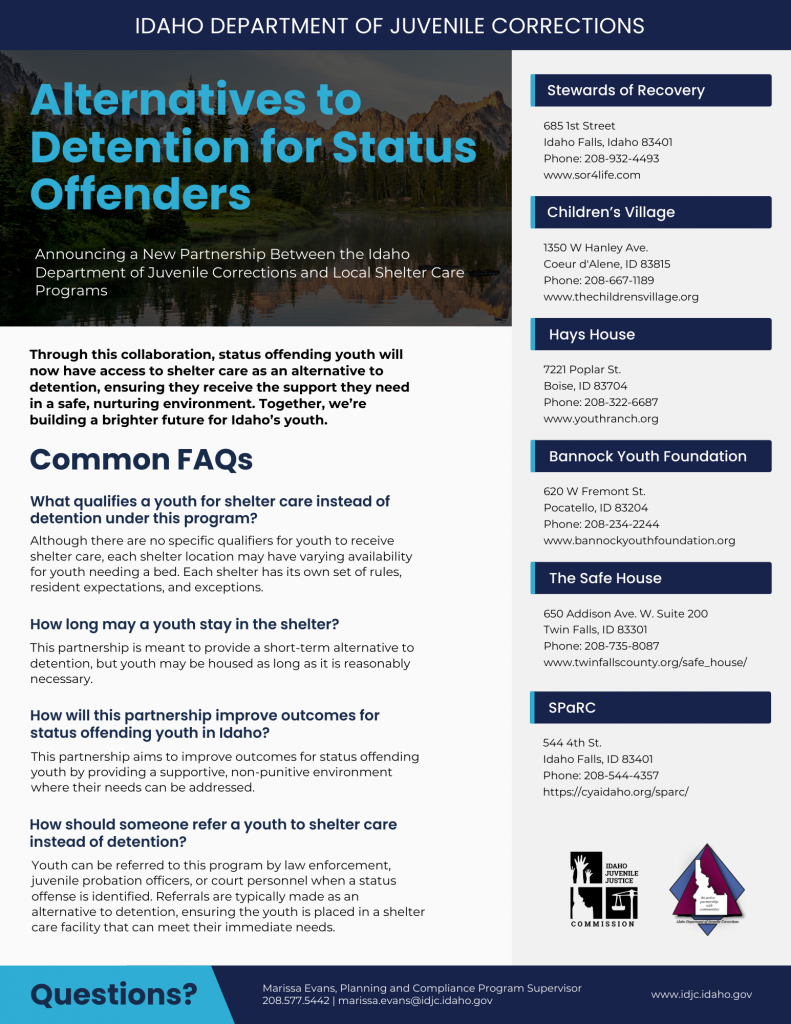The Juvenile Justice and Delinquency Prevention (JJDP) Act establishes four core protections with which participating states and territories must comply to receive grant funds. These protections are to ensure a minimum level of safety and equitable treatment for youth who come into contact with the juvenile justice system. The four core protections are:
The DSO provision seeks to ensure that status offenders who have not committed a criminal offense are not held in secure juvenile facilities for extended periods of time or in secure adult facilities for any length of time.
Instead, these youth should receive community-based services, such as day treatment or residential home treatment, counseling, mentoring, family support, and alternative education.
- Detention facilities are often ill-equipped to address the underlying causes
- Detention does not serve as a deterrent
- Placing youth in detention facilities jeopardizes their safety and well-being, and may increase the likelihood of delinquent or criminal behavior
Under this requirement, youth may not be detained in adult jails and lock-ups except for certain exceptions.
This provision is designed to protect youth from psychological abuse, physical assault, and isolation.
- Youth housed in adult jails and lock-ups have been found to be eight times more likely to commit suicide, two times more likely to be assaulted by staff, and 50 percent more likely to be attacked with a weapon than youth housed in juvenile facilities.
Under “sight and sound,” youth cannot be housed next to adult cells, share dining halls, recreation areas, or any other common spaces with adults, or be placed in any circumstance that could expose them to threats or abuse from adult offenders.
This provision seeks to prevent youth from threats, intimidation, or other forms of psychological abuse and physical assault.
This requirement focuses on reducing the disproportionate number of juvenile members of minority groups who come into contact with the juvenile justice system.
- National studies indicate that youth of color receive tougher sentences and are more likely to be incarcerated than white youth for the same offenses.
- With youth of color comprising one-third of the youth population but two-thirds of youth in contact with the juvenile justice system, this provision requires states and local jurisdictions to create action plans to address disparities within their systems.
Announcements

Introducing New Alternatives To Detention for Idaho’s Youth
The Idaho Department of Juvenile Corrections and the Idaho Juvenile Justice Commission have partnered to bring a new detention alternative option throughout the state. Through this collaboration, status-offending youth will now have access to shelter care as an alternative to detention, ensuring they receive the support they need in a safe, nurturing environment. Together, we’re building a brighter future for Idaho’s youth.
If you have any questions, please reach out to Marissa Evans, IDJC COPS Planning and Compliance Supervisor at marissa.evans@idjc.idaho.gov or 208-577-5442.
Planning & Compliance Team
|
|
|
|
 Official Government Website
Official Government Website


